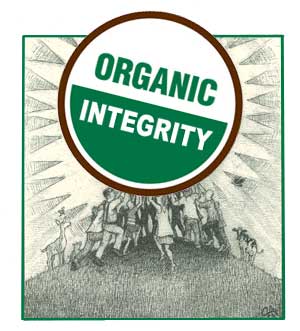15
May
Trust in Organic Label Suffering as USDA Undermines Organic Integrity
(Beyond Pesticides, May 15, 2015) Why do you buy organic? Recent research by Mintel, a business research firm, reveals that Americans buy organic for different reasons. The perception that the products are healthier (72 percent) is the biggest draw, even more so than any environmental or ethical reason (69 percent). Only 29 percent of consumers recognize that organic products are highly regulated, while 51 percent believe that the organic label is an excuse to charge more. While sales of organic products are on the rise, actual consumer penetration has plateaued. With the barrage of attacks by the U.S. Department of Agriculture (USDA) on the organic label, it comes as no surprise that consumer skepticism remains high. Many consumer and farm organizations believe that public trust will continue to decline if USDA continues its attack on the procedures and public process that has built the organic industry to its $40 billion size.
A further look into why consumers choose organic reveals that female shoppers choose products to avoid certain characteristics — 43 percent do so because they do not contain unnecessary ingredients and chemicals, and the same percentage  do so to avoid food grown with pesticides. Thirty-one percent of women and 29 percent of men purchase organic because they are less processed than their conventional, non-organic counterparts, and 20 percent of women and 16 percent of men purchase organic because animals are treated more ethically by organic companies. Generational differences also exist. Over half of Millennials (51 percent) indicate they feel better about themselves when they purchase organic products, a factor that declines notably among older generations, to less than a quarter of Baby Boomers (24 percent).
do so to avoid food grown with pesticides. Thirty-one percent of women and 29 percent of men purchase organic because they are less processed than their conventional, non-organic counterparts, and 20 percent of women and 16 percent of men purchase organic because animals are treated more ethically by organic companies. Generational differences also exist. Over half of Millennials (51 percent) indicate they feel better about themselves when they purchase organic products, a factor that declines notably among older generations, to less than a quarter of Baby Boomers (24 percent).
Older generations are especially distrustful of the organic label. While 42 percent of Millennials indicate they purchased an organic food or drink in the last three months, purchase rates drop dramatically among Baby Boomers and older consumers, who indicate different reasons for not choosing organic. Fifty-one percent of Generation X (those born in the mid-1960s to early 1980s) and 57 percent of the Swing Generation (those 65 and older) regard the organic label as a premium price tag. Only 39 percent of Gen X trust that products labeled as organic are actually organic, and this number dips to 35 percent of Swing Generation consumers. Additionally, only 40 percent of Millennials, although they are the demographic that most supports organic, recognize that organic products are highly regulated. For all consumers, 38 percent view organic as simply a marketing term with no definition or real value.
The fight to maintain organic’s integrity is ongoing. USDA is threatening the future of organic with changes that will further weaken public trust in the organic label. In April, organic farm and certification, environmental, and food safety groups and organic producers challenged a major USDA change to the organic rule, maintaining that the agency violated the federal rulemaking process when it changed without public hearing and comment long standing procedures for reviewing the potential hazards and need for allowed synthetic and prohibited natural substances used in producing organic food. Environmental and food safety groups also sued the agency for failing to follow the law and not seeking public comment on the organic compost rule.
Beyond Pesticides promotes organic agriculture because organic food contributes to better health through reduced pesticide exposure for all and increased nutritional quality. In order to understand the importance of eating organic food from the perspective of toxic pesticide contamination, we need to look at the whole picture””from the farmworkers who do the valuable work of growing food, to the waterways from which we drink, the air we breathe, and the food we eat. Organic food can feed us and keep us healthy without producing the toxic effects of chemical agriculture. Consumers can help maintain the integrity of the organic label, and thus protect the food we eat as well as the environment, by reading more about the issues at our Save Our Organic page. Consumers can also check out Beyond Pesticides’ Eating with a Conscience database, which documents the impacts on the environment and farmworkers of the toxic chemicals used in conventional agriculture.
Source: Mintel
All unattributed positions and opinions in this piece are those of Beyond Pesticides










